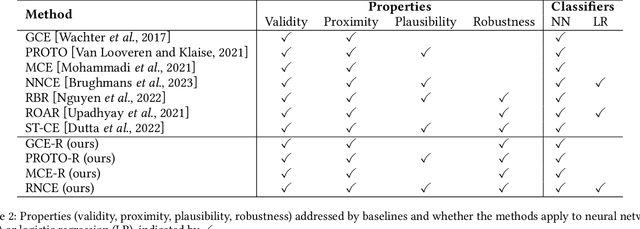Interval Abstractions for Robust Counterfactual Explanations
Paper and Code
Apr 21, 2024



Counterfactual Explanations (CEs) have emerged as a major paradigm in explainable AI research, providing recourse recommendations for users affected by the decisions of machine learning models. However, when slight changes occur in the parameters of the underlying model, CEs found by existing methods often become invalid for the updated models. The literature lacks a way to certify deterministic robustness guarantees for CEs under model changes, in that existing methods to improve CEs' robustness are heuristic, and the robustness performances are evaluated empirically using only a limited number of retrained models. To bridge this gap, we propose a novel interval abstraction technique for parametric machine learning models, which allows us to obtain provable robustness guarantees of CEs under the possibly infinite set of plausible model changes $\Delta$. We formalise our robustness notion as the $\Delta$-robustness for CEs, in both binary and multi-class classification settings. We formulate procedures to verify $\Delta$-robustness based on Mixed Integer Linear Programming, using which we further propose two algorithms to generate CEs that are $\Delta$-robust. In an extensive empirical study, we demonstrate how our approach can be used in practice by discussing two strategies for determining the appropriate hyperparameter in our method, and we quantitatively benchmark the CEs generated by eleven methods, highlighting the effectiveness of our algorithms in finding robust CEs.
 Add to Chrome
Add to Chrome Add to Firefox
Add to Firefox Add to Edge
Add to Edge